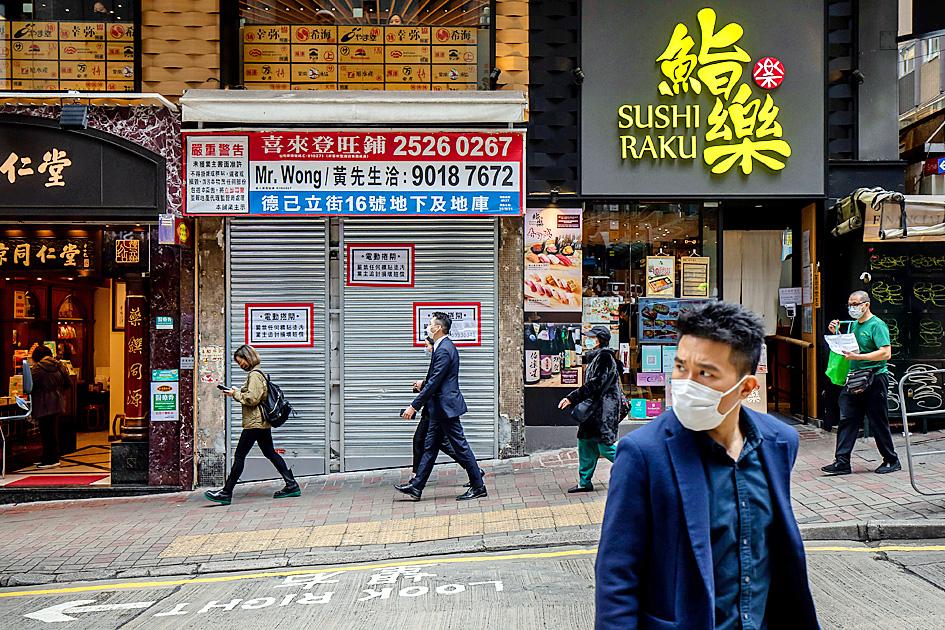Hong Kong might only reopen in early 2024 because of its stringent COVID-19 policies, which could trigger an exodus of foreign firms and staff, and jeopardize its role as a financial hub, the territory’s European Chamber of Commerce said in a draft report.
The limited effectiveness of locally developed vaccines is forcing China to maintain tight restrictions on travel, the chamber said in the draft, which was reviewed by Reuters, but has not been made public.
The European Chamber of Commerce declined to comment on the report.

Photo: Bloomberg
The most likely scenario for Hong Kong would be that it would not reopen until China rolls out its messenger RNA (mRNA) vaccine across its 1.4 billion population, which could take until late next year or early 2024, it said.
If that was the case, the chamber said there was a risk of a “cascade effect” of firms leaving Hong Kong.
“We anticipate an exodus of foreigners, probably the largest than [sic] Hong Kong has ever seen, and one of the largest in absolute terms from any city in the region in recent history,” it said.
While Hong Kong has succeeded in keeping the virus under control for much of last year, it has become one of the world’s most isolated places because of its travel restrictions and intermittent lockdowns that have accelerated a brain drain from the former British colony.
Hong Kong saw a surge of infections this month, which authorities have struggled to control.
Given the scenario, multinational firms would increasingly relocate China-focused teams to the mainland or shift their Asian regional teams to Singapore or Seoul, the chamber said.
Hong Kong could lose its appeal as an international business hub as well as its potential to contribute to China’s economy.
The departure of international talent could also undermine the territory’s “potential to maintain world-class universities,” it said.
Unlike China, Hong Kong is dependent on business travelers and imported goods.
Its role as one of the world’s main transshipment and passenger hubs has been drastically curtailed by tough flight restrictions, which mean very few people are allowed to land and hardly anyone is allowed to transit.
In contrast, the rival financial hub of Singapore has eased its coronavirus curbs including border controls.
Only about 70 percent of people in Hong Kong have been double-vaccinated, compared with 91 percent of Singapore’s eligible population.
Most of Hong Kong’s elderly people have not been vaccinated.
The chamber outlined other scenarios of “average likelihood” including the possibility of an uncontrolled outbreak in the mainland leading to Hong Kong sealing its boundary with China and reopening with the rest of the world.
Another scenario was an uncontrolled outbreak in Hong Kong, which would make any additional restrictions meaningless. This could cause up to 20,000 deaths among elderly people.
The chamber made recommendations to the government, including accelerating vaccinations and shortening quarantine from 21 days to seven to 14 days, which would please the international business community.
Foreign businesses should assume that Hong Kong would very likely be “semi-closed for international travel in the coming 12-36 months,” it said.

The US dollar was trading at NT$29.7 at 10am today on the Taipei Foreign Exchange, as the New Taiwan dollar gained NT$1.364 from the previous close last week. The NT dollar continued to rise today, after surging 3.07 percent on Friday. After opening at NT$30.91, the NT dollar gained more than NT$1 in just 15 minutes, briefly passing the NT$30 mark. Before the US Department of the Treasury's semi-annual currency report came out, expectations that the NT dollar would keep rising were already building. The NT dollar on Friday closed at NT$31.064, up by NT$0.953 — a 3.07 percent single-day gain. Today,

‘SHORT TERM’: The local currency would likely remain strong in the near term, driven by anticipated US trade pressure, capital inflows and expectations of a US Fed rate cut The US dollar is expected to fall below NT$30 in the near term, as traders anticipate increased pressure from Washington for Taiwan to allow the New Taiwan dollar to appreciate, Cathay United Bank (國泰世華銀行) chief economist Lin Chi-chao (林啟超) said. Following a sharp drop in the greenback against the NT dollar on Friday, Lin told the Central News Agency that the local currency is likely to remain strong in the short term, driven in part by market psychology surrounding anticipated US policy pressure. On Friday, the US dollar fell NT$0.953, or 3.07 percent, closing at NT$31.064 — its lowest level since Jan.

The New Taiwan dollar and Taiwanese stocks surged on signs that trade tensions between the world’s top two economies might start easing and as US tech earnings boosted the outlook of the nation’s semiconductor exports. The NT dollar strengthened as much as 3.8 percent versus the US dollar to 30.815, the biggest intraday gain since January 2011, closing at NT$31.064. The benchmark TAIEX jumped 2.73 percent to outperform the region’s equity gauges. Outlook for global trade improved after China said it is assessing possible trade talks with the US, providing a boost for the nation’s currency and shares. As the NT dollar

The Financial Supervisory Commission (FSC) yesterday met with some of the nation’s largest insurance companies as a skyrocketing New Taiwan dollar piles pressure on their hundreds of billions of dollars in US bond investments. The commission has asked some life insurance firms, among the biggest Asian holders of US debt, to discuss how the rapidly strengthening NT dollar has impacted their operations, people familiar with the matter said. The meeting took place as the NT dollar jumped as much as 5 percent yesterday, its biggest intraday gain in more than three decades. The local currency surged as exporters rushed to